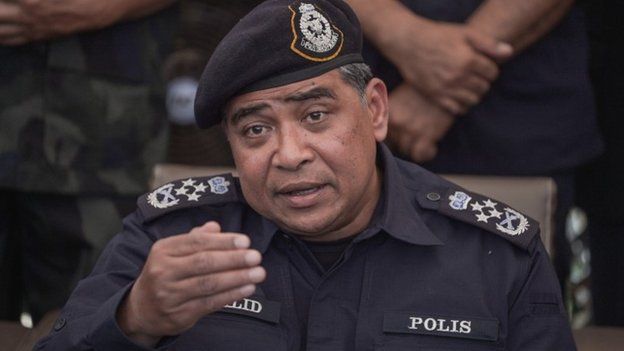Malaysian police find 139 suspected migrant graves
- Published

Malaysian police say 139 suspected migrant grave sites have been found in 28 people-trafficking camps along the Thai border.
National police chief Khalid Abu Bakar said some of the graves, found since 11 May, may contain more than one body.
They are close to an area of Thailand where trafficking camps and dozens of shallow graves were found this month.
Thailand subsequently cracked down on the routes used by traffickers to move migrants through its territory.
The operation forced traffickers to move the migrants by sea instead. But thousands were left stranded after the traffickers abandoned them and no country would take them in.
The traffickers have been using the jungles of southern Thailand and northern Malaysia for years to smuggle people into Malaysia. Most of the migrants are Rohingya Muslims fleeing persecution in Myanmar, rights groups say, but others are Bangladeshis seeking employment in Malaysia.
'Questions will be asked'
"[In] the operation which we have been conducting from 11 May to 23 May we discovered 139 of what we believe are graves," Mr Khalid told reporters on Monday.
Jonathan Head has been investigating Thailand's human trafficking trade for six months
The camps were found along a 50-km (30-mile) stretch of the Thai-Malaysian border and were only hundreds of metres from the graves discovered in Thailand, he said.
Mr Khalid was speaking at a press conference a day after the government first announced the discovery of Malaysian graves. He said the biggest of the camps could have held up to 300 people.
Officials are now exhuming the bodies to determine whether they were victims of human trafficking.
'They are just bones'
The International Organization for Migration (IOM) says since the Thai crackdown, they have found several people roaming in the Thai forests.
Jeffrey Labovitz, chief of mission in Thailand for the IOM, said they had screened people rescued from detention or shelters in Thailand and found some infected with beriberi - a disease caused by a vitamin B1 deficiency.
"It's people who are skeletal, they have no fat on their body they're just bones. They can no longer support their weight," he told the BBC.
"They are no longer a commodity to smugglers they're an example to others that they have to pay."
Earlier, Malaysia Prime Minister Najib Razak said he was "deeply concerned with graves found on Malaysian soil, purportedly connected to people-smuggling". Writing on his Facebook and Twitter accounts, he promised to "find those responsible".
The BBC's Jonathan Head in Bangkok says that as on the Thai side, the Malaysian camps are situated in an area with a strong military and police presence, and questions will be asked about why the authorities took no action before now - action that might have saved lives.
An investigation by our correspondent has found entire communities in Thailand helping the traffickers.
Asia's migrant crisis
- Rohingya Muslims mainly live in Myanmar, where they have faced decades of persecution.
- Rights groups say migrants feel they have "no choice" but to leave, paying people smugglers to help them.
- The UN estimates more than 120,000 Rohingyas have fled in the past three years.
- Traffickers usually take the migrants by sea to Thailand then overland to Malaysia.
- But Thailand recently began cracking down on the migrant routes, meaning traffickers are using sea routes instead often abandoning the boats once at sea.
Since Thailand began its crackdown on smuggling routes, thousands of people have instead tried to reach Malaysia by sea, crowded onto fishing boats which are then abandoned by their traffickers.
Indonesian, Malaysian and Thailand had been turning away boats, despite worsening conditions on board and a lack of supplies.
Last week, Indonesia and Malaysia agreed to provide temporary shelter to the migrants, after coming under international pressure, but asked for them to be resettled by the international community within a year.